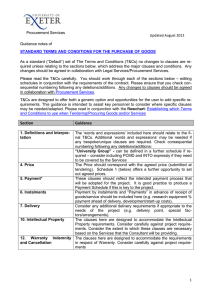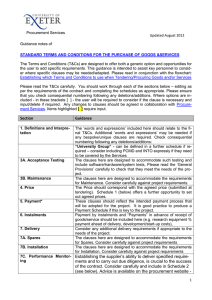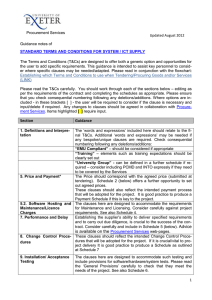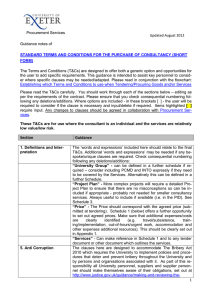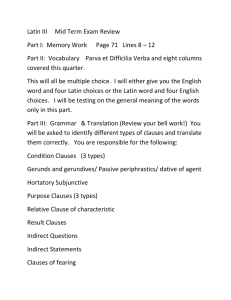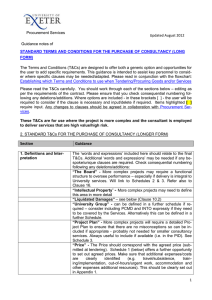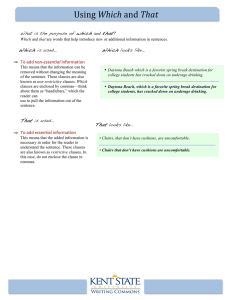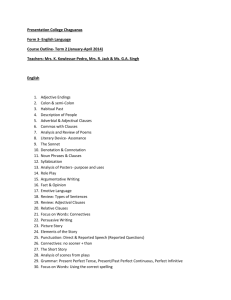Guidance notes - services
advertisement
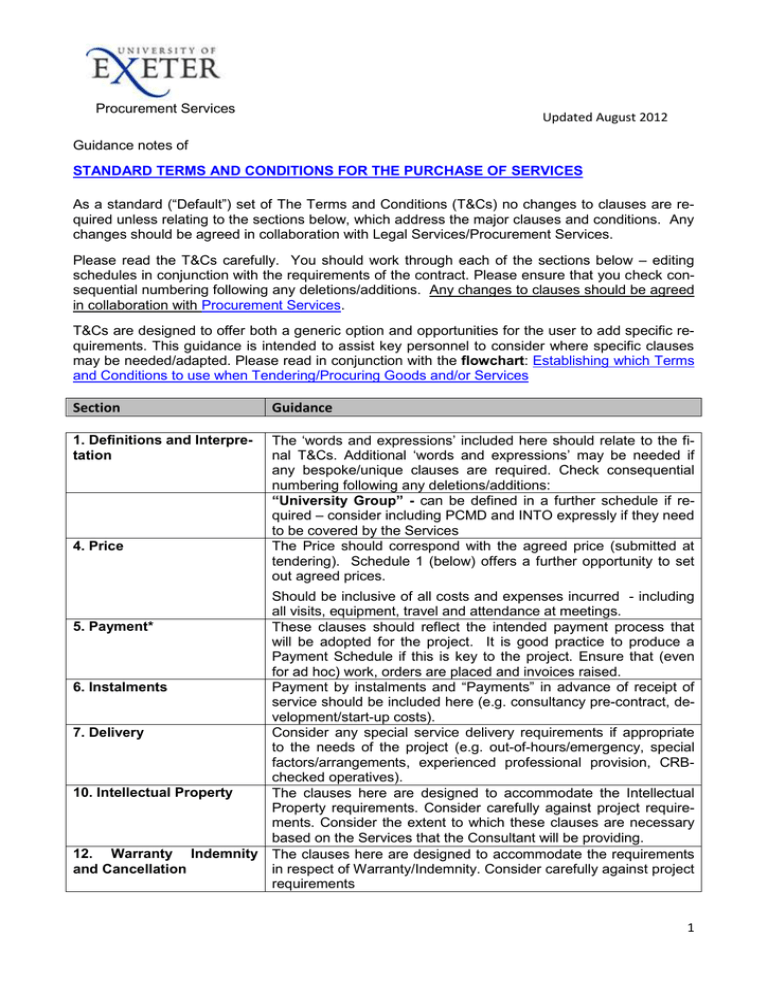
Procurement Services Updated August 2012 Guidance notes of STANDARD TERMS AND CONDITIONS FOR THE PURCHASE OF SERVICES As a standard (“Default”) set of The Terms and Conditions (T&Cs) no changes to clauses are required unless relating to the sections below, which address the major clauses and conditions. Any changes should be agreed in collaboration with Legal Services/Procurement Services. Please read the T&Cs carefully. You should work through each of the sections below – editing schedules in conjunction with the requirements of the contract. Please ensure that you check consequential numbering following any deletions/additions. Any changes to clauses should be agreed in collaboration with Procurement Services. T&Cs are designed to offer both a generic option and opportunities for the user to add specific requirements. This guidance is intended to assist key personnel to consider where specific clauses may be needed/adapted. Please read in conjunction with the flowchart: Establishing which Terms and Conditions to use when Tendering/Procuring Goods and/or Services Section Guidance 1. Definitions and Interpretation The ‘words and expressions’ included here should relate to the final T&Cs. Additional ‘words and expressions’ may be needed if any bespoke/unique clauses are required. Check consequential numbering following any deletions/additions: “University Group” - can be defined in a further schedule if required – consider including PCMD and INTO expressly if they need to be covered by the Services The Price should correspond with the agreed price (submitted at tendering). Schedule 1 (below) offers a further opportunity to set out agreed prices. 4. Price Should be inclusive of all costs and expenses incurred - including all visits, equipment, travel and attendance at meetings. 5. Payment* These clauses should reflect the intended payment process that will be adopted for the project. It is good practice to produce a Payment Schedule if this is key to the project. Ensure that (even for ad hoc) work, orders are placed and invoices raised. 6. Instalments Payment by instalments and “Payments” in advance of receipt of service should be included here (e.g. consultancy pre-contract, development/start-up costs). 7. Delivery Consider any special service delivery requirements if appropriate to the needs of the project (e.g. out-of-hours/emergency, special factors/arrangements, experienced professional provision, CRBchecked operatives). 10. Intellectual Property The clauses here are designed to accommodate the Intellectual Property requirements. Consider carefully against project requirements. Consider the extent to which these clauses are necessary based on the Services that the Consultant will be providing. 12. Warranty Indemnity The clauses here are designed to accommodate the requirements and Cancellation in respect of Warranty/Indemnity. Consider carefully against project requirements 1 Procurement Services NB: TUPE - The Transfer of Undertakings (Protection of Employment) Regulations (TUPE) protects employees' terms and conditions of employment when a business is transferred from one owner to another. Please consider carefully and seek advice where employees of the previous provider may be employed on the same contract with the new provider. If you consider that you contract has an element of TUPE please use the Terms & Conditions for Goods and Services Schedules The schedules are designed to firm up the agreement once the contract has been won (a successful bidder at tender stage). The Schedules should prevent any misconceptions about contract delivery and assist contract management. Potential suppliers should be asked to provide these as part of the tender process. Schedule 1 ; Price Schedule The inclusion of a Price Schedule on the basis of the winning tender will enable contract managers to check actually prices with those agreed. Make sure that additional expenses/costs are clearly identified (e.g. travel/subsistence, training/implementation, outof-hours/urgent work, additional resources). Schedule 2: Key perfor- For the provision of Services KPIs are likely to be around quality mance Indicators (KPIs) and timeliness of delivery, speed of response, reporting functions). KPIS will allow the contract manager to assess how the contract is meeting needs. For further advice on Assessing Supplier Performance visit Good Practice 4. Schedule 3: Project/ Service Delivery Plan More complex service provision will require a detailed approach to services delivery (e.g. availability of intrinsic support, timely experienced/knowledgeable input, reporting regimes). A Plan that agrees actions at the key stages and agrees standards is often useful. For further Procurement Advice please visit Procurement Services - Finance Services - University of Exeter * following a recent Government announcement, departments in government are now encouraged to pay their suppliers within 10 days of a valid invoice. This is to help businesses that are faced with increased cash flow problems in the current economic climate. It should be noted however that the standard payment terms (which can be modified) set out in these Standard Terms and Conditions state that contractuallybinding arrangements remain at 30 days. 2
